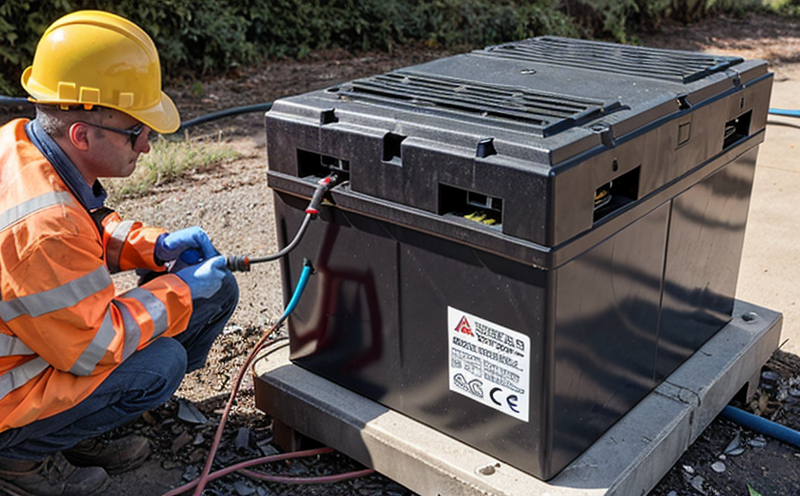UL 2054 Lead-Acid Household Battery Testing
The UL 2054 standard is a cornerstone in ensuring the safety and performance of lead-acid batteries intended for household use. This testing service is crucial for manufacturers, quality managers, compliance officers, and R&D engineers involved in developing products that meet stringent international standards.
UL 2054 specifically addresses the design, construction, and labeling of lead-acid batteries used in residential environments such as backup power systems, uninterruptible power supplies (UPS), and vehicle starting systems. The standard covers a wide range of technical requirements to ensure these batteries are safe for use by consumers without posing risks to their health or property.
The testing process involves several key components that must be meticulously addressed:
- Initial battery discharge and charge cycles
- Static storage tests under various environmental conditions (temperature, humidity)
- Safety checks including overcharging, short circuiting, and thermal stability
- Labeling requirements for clear identification of the battery’s specifications
The UL 2054 standard is particularly stringent in its approach to safety. It mandates rigorous testing to ensure that batteries do not pose a fire hazard or release toxic gases under normal operating conditions and during accidental misuse.
For manufacturers, adhering to this standard not only ensures compliance with international regulations but also enhances the reputation of their products. Meeting these standards can open doors to new markets and build trust among consumers who are increasingly concerned about product safety.
The UL 2054 testing process is comprehensive and detailed, requiring specialized equipment and expertise. Our laboratory utilizes state-of-the-art facilities and experienced technicians to ensure that all tests are conducted accurately and efficiently. This commitment to quality helps manufacturers avoid costly delays and rework during the certification process.
In summary, compliance with UL 2054 is essential for any manufacturer of lead-acid batteries intended for household use. The testing ensures not only regulatory compliance but also enhances product safety and reliability, which are critical factors in today’s consumer electronics market.
Applied Standards
The UL 2054 Lead-Acid Household Battery Testing service is underpinned by several key standards that ensure the highest level of safety and performance:
- UL 2054: Standard for Lead-Acid Batteries Used in Residential Applications
- IEC 61972-2: Battery chargers for lead-acid batteries - Part 2: General requirements for battery chargers and related equipment
- ASTM G87-14a: Standard Test Method for Electrochemical Testing of Lead-Acid Batteries
The UL 2054 standard is particularly comprehensive, covering the design, construction, labeling, and testing procedures for lead-acid batteries. It ensures that these batteries are safe to use in residential settings and do not pose any fire or explosion hazards.
IEC 61972-2 provides additional guidance on battery chargers, ensuring they work safely with the batteries being tested. ASTM G87 outlines specific methods for electrochemical testing, which is crucial for assessing the performance and longevity of lead-acid batteries.
The combination of these standards ensures that the testing process is thorough and reliable, providing manufacturers with the confidence that their products meet all necessary safety and performance requirements.
Competitive Advantage and Market Impact
Compliance with UL 2054 Lead-Acid Household Battery Testing offers significant competitive advantages for manufacturers. By ensuring strict adherence to this standard, companies can:
- Avoid costly recalls and legal issues. Non-compliant products that fail safety tests could face mandatory recalls, which are both expensive and damaging to brand reputation.
- Promote product safety and reliability. Meeting the stringent requirements of this standard enhances consumer trust, leading to increased sales and market share.
- Facilitate global market access. Many countries require compliance with UL standards for entry into their markets. This testing service opens doors to international markets without the need for additional certifications.
The testing process not only ensures regulatory compliance but also improves product design and performance, which are crucial factors in today’s competitive market. By investing in this testing service, manufacturers can differentiate themselves from competitors and gain a significant edge in the marketplace.
Moreover, UL 2054 certification demonstrates a commitment to excellence that resonates with consumers who value safety and quality. This commitment translates into higher customer satisfaction and loyalty, which are vital for long-term success.





